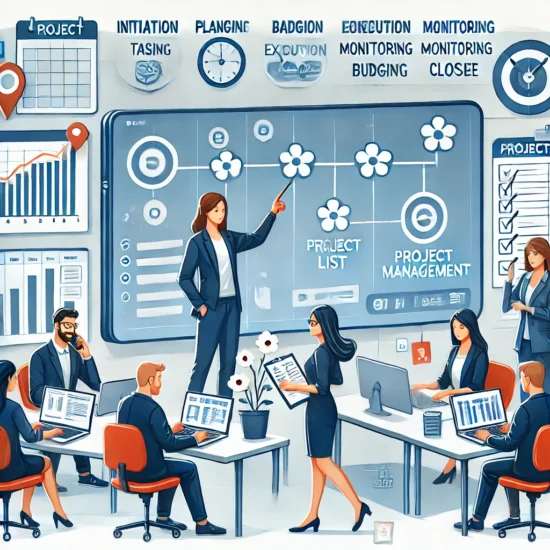What is Project Management? – Project management leads a team to achieve specific objectives within set constraints, including time, scope, and budget. Whether it’s building a bridge, developing a software application, or launching a new marketing campaign, careful coordination, planning, and execution are needed to ensure its success.
Project management involves using a combination of skills, tools, and strategies to move a project from concept to completion while effectively balancing the needs and expectations of various stakeholders. At the core of project management is the project manager, who bears the responsibility of overseeing all project aspects.
This includes setting objectives, defining deliverables, managing resources, and keeping the team on track to meet deadlines. The project manager’s role is crucial, as they must ensure that everything aligns with the organization’s strategic goals, even within the approved budget and timeline.
Strong leadership, communication, and problem-solving skills are essential for a project manager to navigate challenges and adapt to changing circumstances, underscoring their pivotal role in the project’s success.
Project management isn’t limited to a specific industry; it is applicable across various sectors, including construction, healthcare, information technology, education, and more. Project management principles are used in any environment where multiple tasks need to be coordinated to achieve a single goal.
Whether it’s building a hospital, implementing a new software system, or launching a marketing campaign, project management is a crucial tool for success. As organizations grow and evolve, the need for effective project management becomes more pronounced.
According to a study from the Project Management Institute (PMI), companies with effective project management practices execute more initiatives successfully, stay within budget, and consistently meet business goals.
This highlights the importance of project management as a critical component for achieving success in today’s fast-paced, competitive business world, making it a significant factor in business goal achievement.
Defining Project Management
Project management is the structured procedure of guiding a task from inception to crowning glory, ensuring that dreams are met within precise constraints, time, finances, and scope. It involves utilizing various abilities, tools, and methodologies to attain the preferred final results while successfully managing assets and stakeholders.
The middle reason for venture control is to obtain undertaking goals by breaking down complex responsibilities into achievable components and overseeing the development of these obligations to meet time limits.
A challenge is, by definition, a brief enterprise designed to provide a unique product, service, or result. It has a defined beginning and stops, in contrast to ongoing operations, which might be continuous. Project control, therefore, specializes in meeting unique targets within a fixed time frame and normally includes several stages: initiation, making plans, execution, tracking, and closure.
The venture manager is pivotal in coordinating the challenge team and ensuring all sports align with the task. This involves cautious, useful resource allocation, change control, and communication to keep everyone on the same web page. The project supervisor must ensure the venture stays within finances and meets first-class requirements.
In essence, venture management brings order to complex obligations, permitting businesses to execute projects successfully and acquire their strategic objectives. Whether launching a new product or implementing an IT system, undertaking management is the framework that guarantees success by fostering collaboration, minimizing risks, and optimizing performance at some point in the task lifecycle.

The Basics of Project Management
The fundamentals of challenge control revolve around coping with the important factors that affect emissions: scope, time, fee, and great. These elements are regularly known as the “triple” co”strain” (scope, time, and cost), with satisfaction being an important final result.
Project management specializes in balancing these constraints while ensuring the challenge meets its goals and gives value to stakeholders. At the center of task management is the mission lifecycle, which includes five phases: initiation, making plans, execution, monitoring and managing, and closure.
Each section is essential in moving the venture from idea to finishing touch. Initiation includes defining the task, setting objectives, and securing stakeholder approval. Planning is where the assignment roadmap is developed, which includes timelines, resource allocation, and danger control techniques.
Execution is the section where the challenge plan is carried out, duties are finished, and groups work closer to the challenge desires. Monitoring and control guarantee that the venture stays on track by monitoring development, dealing with sources, and adjusting the plan to cope with challenges.
Closure is the final phase, where deliverables are handed over, documentation is completed, and a post-venture assessment is carried out to identify training learned. These basics provide a based approach to managing a project, permitting groups to live prepared.
Mitigate dangers, and ensure that the challenge is finished on time, within budget, and to the specified standard of satisfaction. Understanding and applying those fundamentals is key to undertaking achievement throughout any enterprise or area.
Why is Project Management Important?
Project control is critical because it presents a dependent framework to ensure that projects are completed efficiently, on time, and within budget. Without powerful venture management, teams can struggle to stay aligned with desires, leave out cut-off dates, overspend, and fail to meet stakeholders’ expectations.
Project control brings order and accountability to complex projects, permitting agencies to reap their goals with minimum danger. One of the top reasons task control is vital is its function in useful resource allocation.
Proper planning guarantees that the proper people, gear, and substances are available when needed, reducing the chance of delays. This organized approach to aid control prevents the unusual pitfalls of miscommunication, overuse of resources, or underutilization, which can all contribute to project failure.
Another key benefit is chance control. Every mission incorporates risks, whether or not associated with time constraints, financial barriers, or unforeseen problems. Project management includes methods for identifying capacity dangers early, developing mitigation techniques, and adjusting the plan as necessary to decrease the challenge’s effect.
Project control facilitates verbal exchange and collaboration amongst crew individuals and stakeholders. It ensures each person is clear on their roles, obligations, and expectancies, leading to a more cohesive attempt.
Finally, task control guarantees that the task maintains consciousness of its goals, keeping the crew aligned with organizational dreams. In this way, it helps the final touch of tasks succeed while maximizing the return on investment and meeting the strategic desires of the commercial enterprise.

Key Project Management Methodologies
Key venture management methodologies offer different methods of organizing and completing projects based on the particular needs and complexities of each undertaking. The most widely used methodologies are Waterfall, Agile, Scrum, and Kanban, each perfect for exclusive initiatives and control patterns.
Waterfall is one of the oldest and most widely used methodologies. It follows a linear, sequential approach where every phase of the challenge—planning, execution, testing, and deployment—must be completed before shifting directly to the next.
This technique is especially suitable for initiatives with virtually described dreams, solid requirements, minimum changes, and people in construction or production. Agile is an extra flexible method that specializes in iterative improvement. It allows groups to work in brief cycles called sprints.
Agile is designed to accommodate alternate and evolving undertaking necessities, making it particularly useful for projects in rapid-moving industries like software development. It encourages collaboration, constant comments, and nonstop improvement throughout the undertaking lifecycle.
Scrum, a subset of Agile, emphasizes teamwork and responsibility. It organizes tasks into smaller, viable pieces with specific goals to be performed in brief sprints, normally lasting two to four weeks. Scrum is based on particular roles, such as Scrum Master and Product Owner, to ensure group collaboration and transparency.
Kanban is a visual challenge management methodology that specializes in managing workflow effectively. Teams use a board with columns representing the levels of the task, shifting responsibilities through the bthey’bthey’rerthey’resfiIt’sed method.
This method is helpful for teams focused on continuous delivery and improving technique performance. These methodologies provide various equipment and techniques for handling initiatives, and the choice of which to use depends on the complexity and requirements of the challenges.
Conclusion
In conclusion, challenge management is a critical area that guarantees the successful execution of tasks throughout numerous industries by applying a based procedure that balances time, budget, scope, and nice.
Through a blend of competencies, gear, and methodologies, mission management offers the framework for agencies to attain their desires while minimizing dangers and ensuring efficient resource allocation. Whether overseeing a creation undertaking, developing a software program, or coping with any complex enterprise, project control is the muse for turning ideas into reality.
The assignment supervisor is central to this system, ensuring that every phase—from initiation to closure—is handled with care and precision. Effective communication, clear planning, and proactive trouble-fixing are crucial in retaining venture alignment with organizational objectives.
Different methodologies like Waterfall, Agile, Scrum, and Kanban provide various methods, catering to the unique desires of initiatives primarily based on their complexity and requirements. With expertise in the principles and tools of task management, teams can perform more cohesively, meet stakeholder expectations, and supply a successful, efficient business environment.
The importance of venture control continues to grow, highlighting its position as a key factor in achieving operational success, strategic alignment, and long-term cost. Your task management or that of an experienced practitioner, getting to know those standards is critical to contributing meaningfully to the success of any undertaking.
FAQs for Project Management
What is project management, and how do you explain it?
Project management involves planning, organizing, and overseeing a task to ensure it meets precise goals within time, budget, and scope. It also involves coordinating resources, managing groups, and fixing problems to finish the assignment successfully and correctly.
What is the main purpose of project management?
The most important purpose of project management is to ensure that a task is finished on time, within budget, and meets the set objectives. It facilitates organizations’ achievement of their strategic goals by presenting a process to control sources, risks, and stakeholder expectations.
What is the scope of project management?
Scope in challenge control refers back to the boundaries of what the task will provide. It consists of the precise goals, responsibilities, deliverables, and consequences that must be completed. Managing scope is crucial to avoid scope creep, wherein additional obligations are introduced without the right evaluation.
What are the benefits of project management?
Project control offers numerous advantages, such as better useful resource control, improved verbal exchange, minimized risks, clear accountability, and increased efficiency. It ensures tasks are finished efficaciously, assembly first-class standards, and stakeholder expectations.
Can you provide an example of project management?
An instance of task management is building a brand new office area. This assignment includes planning (growing the layout, putting a timeline), execution (coping with contractors, overseeing construction), and monitoring (tracking expenses, making sure paintings are fine) until the project is finished and brought on time and within finances.
Read This: https://topalways.co.uk/what-is-operations-management/


